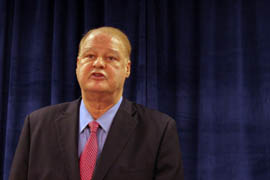Cronkite News has moved to a new home at cronkitenews.azpbs.org. Use this site to search archives from 2011 to May 2015. You can search the new site for current stories.
Arizona to receive $1.6 billion from national foreclosure deal
WASHINGTON – Arizona will receive more than $1.6 billion as part of a roughly $25 billion multistate settlement with the nation’s five largest mortgage lenders over suspect foreclosure practices.
“Arizona has been hit particularly hard by the mortgage crisis, and this agreement is very significant in how it addresses the fraud that these banks committed against homeowners across the state,” said Arizona Attorney General Tom Horne in a prepared statement Thursday.
The settlement with Bank of America, JPMorgan Chase, Wells Fargo, Citigroup and Ally Financial comes almost 16 months after states began investigating those lenders for their role in the housing crisis.
It specifically addresses a practice called “robo-signing,” in which mortgage paperwork was fraudulently signed without regard to documentation, to speed up the foreclosure process.
Most of the settlement will be used to reduce loans for homeowners who are “under water,” or owe more than their homes are worth.
In Arizona, about $1.3 billion will go toward principal reduction for affected homeowners. Most observers predict that will amount to about $20,000 per homeowner nationwide.
The settlement also calls for $2,000 cash payments to people who lost their homes to foreclosure. Those payments in Arizona will total about $110 million of the state’s share.
Arizona this week also settled a separate lawsuit against Bank of America for another $10 million, clearing the way for the state to join the multistate settlement.
Ultimately, 49 states and the District of Columbia signed on to the deal announced Thursday. Only Oklahoma did not join.
Analysts and consumer groups said it is too early to say whether Arizona got a good deal in the settlement or not.
“It’s probably driven by straight arithmetic rather than politics on the part of the states,” said Dennis Hoffman, an economics professor at the W.P. Carey School of Business at Arizona State University.
“Are we 6 to 7 percent of the problem?” he said, referring to the state’s cut of the $25 billion settlement. “It’s hard to know what a fair result would be.”
Ira Rheingold, executive director of the National Association of Consumer Advocates, called the deal a “step in the right direction” but said it is far from what is still needed.
“Is it suitable enough for any state? The banks have done unquestioned damage to our economy,” Rheingold said. “The right amount of money from the banks to fix what they did is far beyond that.”
Rheingold noted that the settlement sets aside money that will go directly to the states – in Arizona’s case, that will be another $102.5 million. Attorneys general will have a lot of discretion on how to use that money, and there is no guarantee it will all be used to help homeowners, he said.
President Barack Obama commended states Thursday for securing a settlement expected to help more than 1 million homeowners.
“No compensation, no amount of money, no measure of justice is enough to make it right for a family who’s had their piece of the American Dream wrongly taken from them,” Obama said at a White House news conference after the deal was announced.
“And no action, no matter how meaningful, is going to, by itself, entirely heal the housing market. But this settlement is a start,” he said.
The settlement will not prevent homeowners from pursuing separate legal action against lenders, officials said.
The deal still needs approval from a federal judge before it is final.
Despite questions about who benefits most from the deal, Hoffman said one thing is certain: The settlement will help homeowners in Arizona “psychologically and financially” who are in dire need of mortgage relief.
“You’re going to see quite a positive impact of those dollars on the Arizona economy,” he said.







